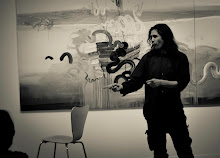When you think about it, the history of philosophy is essentially a temporal monster, or a time-crime of the highest order; and performing mere exacerbates this fact.
Or at least it ought to be. Philosophy only has power (or separate existence) as its ideas speak to us here and now. And yet the same ideas have a history of their own, and what was more all its ideas were always peculiarly rooted in their own times : But this strangely does not matter. I mean Hegel might have thought history ended with the Prussian king, and Marx he revolution was tomorrow, but that does not undermined exactly what they say (any more than the minor Apocalypse undermines Christianity).
But this does not mean the ideas ought to be pulled apart from their history, or seen as logcal and so true and distinct from their times. On the contrary, their history, what they were solving, and how we feel about tt, is actually part of their identity, and infuses their reality for all time. To know them as powerful ideas now, is also therefore to re-conjure there history.
More than this, good ideas crystalise for us, that history so that in them it lives again - and in thinking them we feel its power and passion, as a thing gone, and get still present and vivd. The history of ideas is therefore not only a challenge to our conception of the here and now, as learning the history of the assumptions you simply accept makes you rethink them: but it is also the most vivid of historical romance, and one that really does put the thinker at the centre of the drama. You hear the ideas as they were, and as they are- and are caught up in the moment of their history, even as you feel that history in the moment.
I am currently working on a performance of Behemoth, Hobbes account of the start of the English Civil. It is a book shot through with the politics of his day (it was written in 1668, but then supressed until after his death), but also the memory of the politics of the generation before (it analyses 1640-1660), and has is its debates, echoes so much of what we think today. A good performance of it, ought therefore to let all this aspects out -- the audience ought to be back in time, even as they feel the power of the arguments today: To read and perform it is is therefore to breed temporal monsters, or to commit a crime against time.


No comments:
Post a Comment